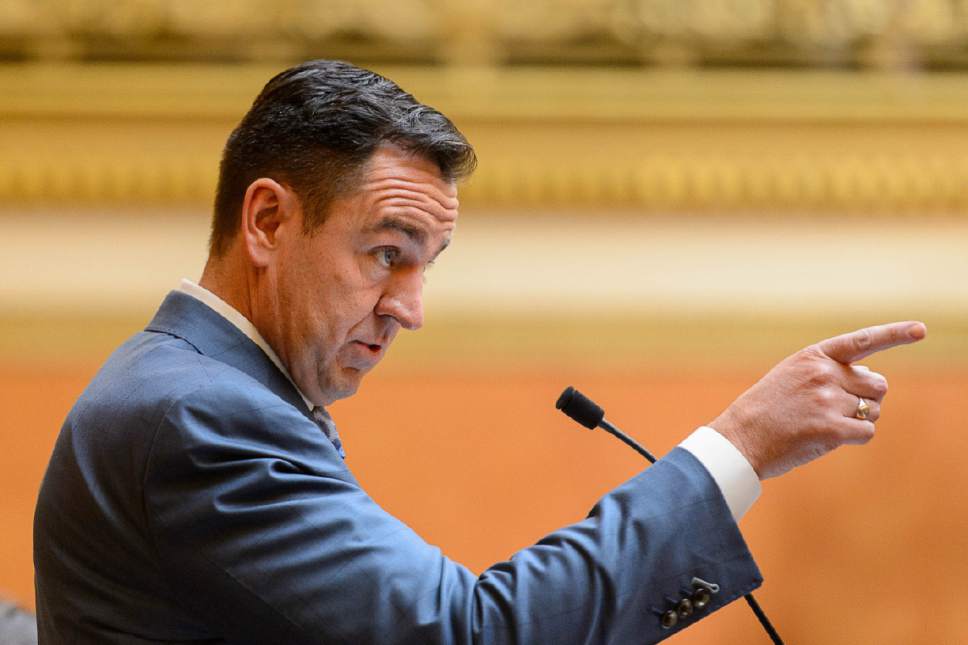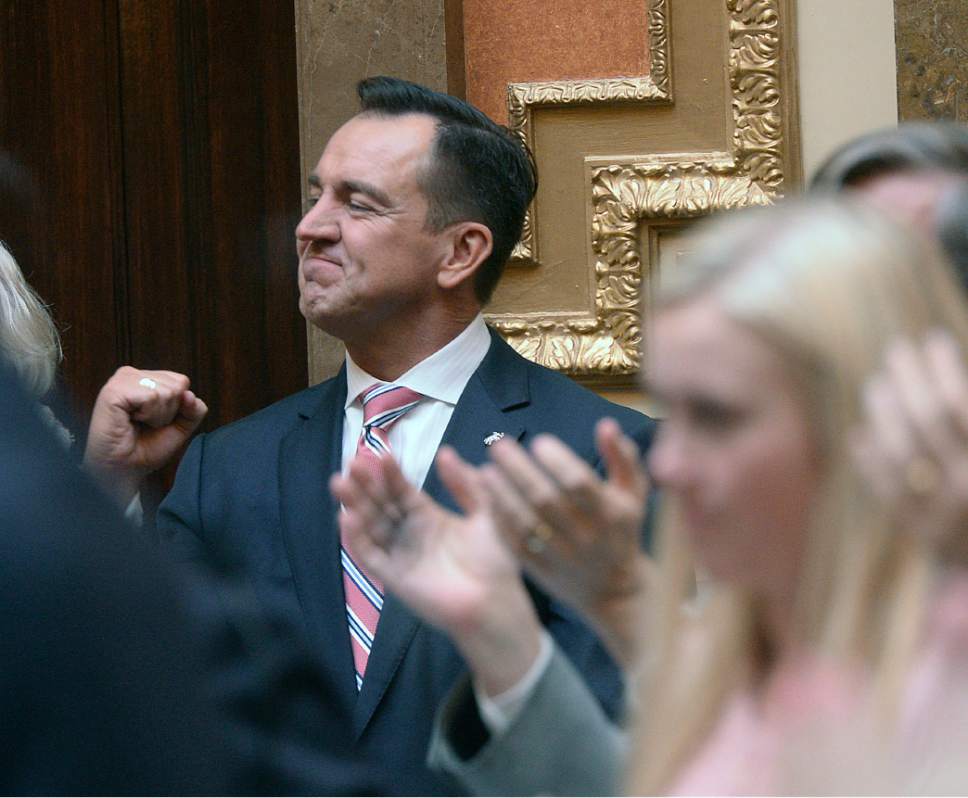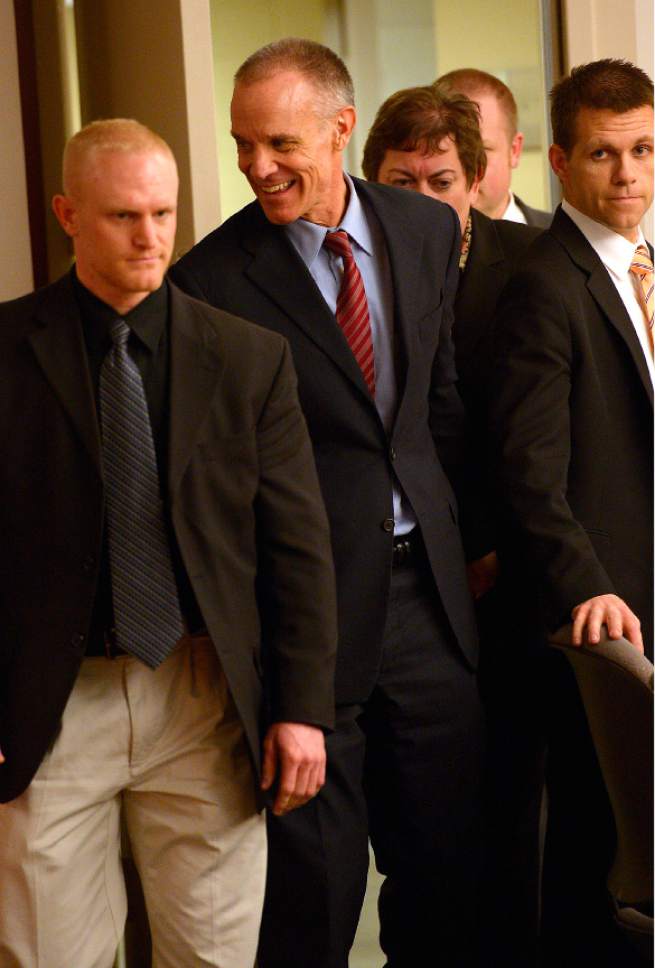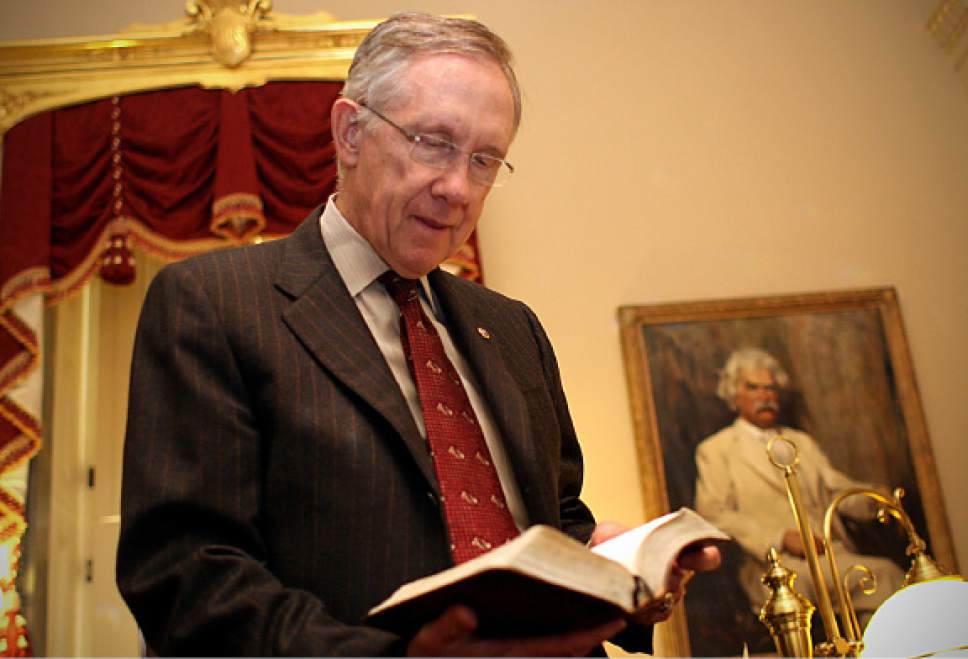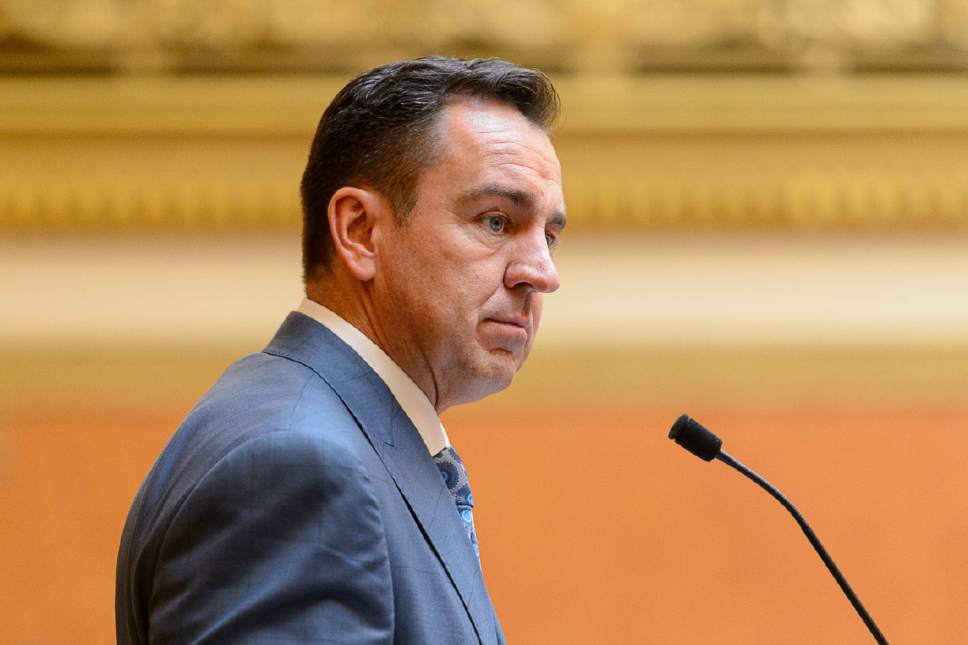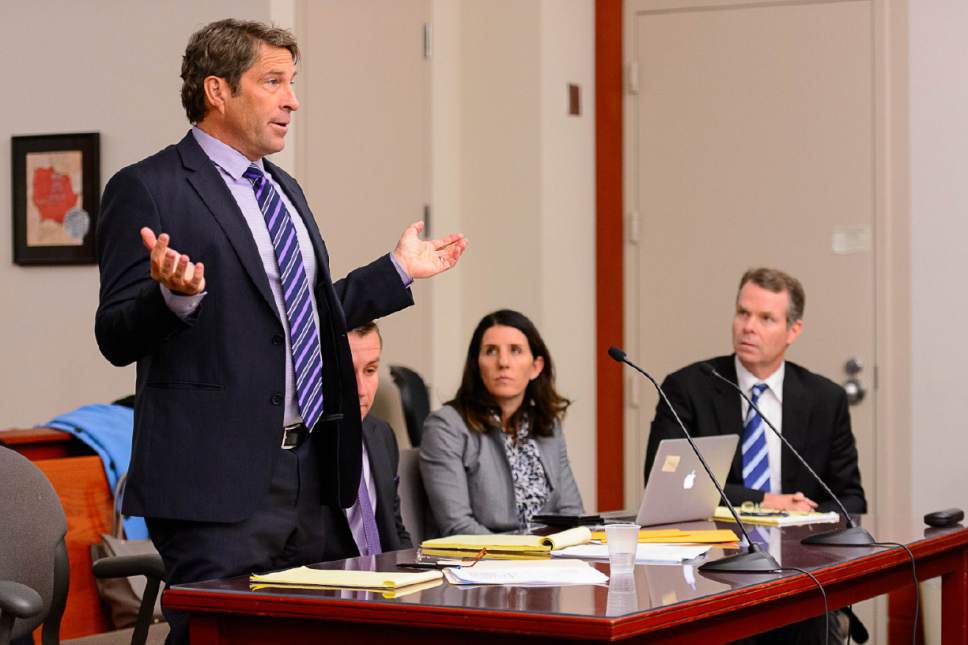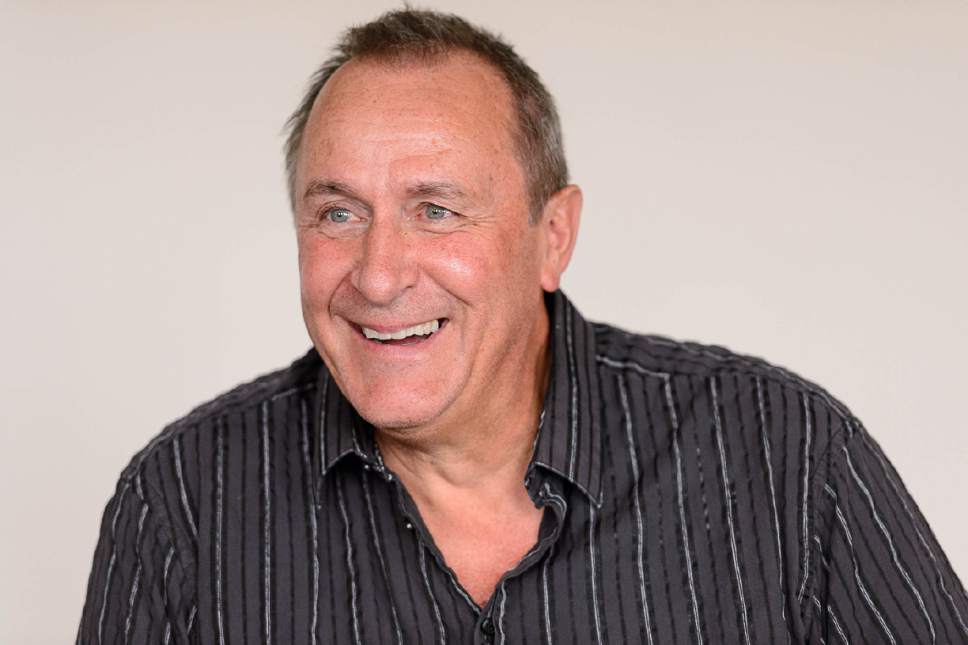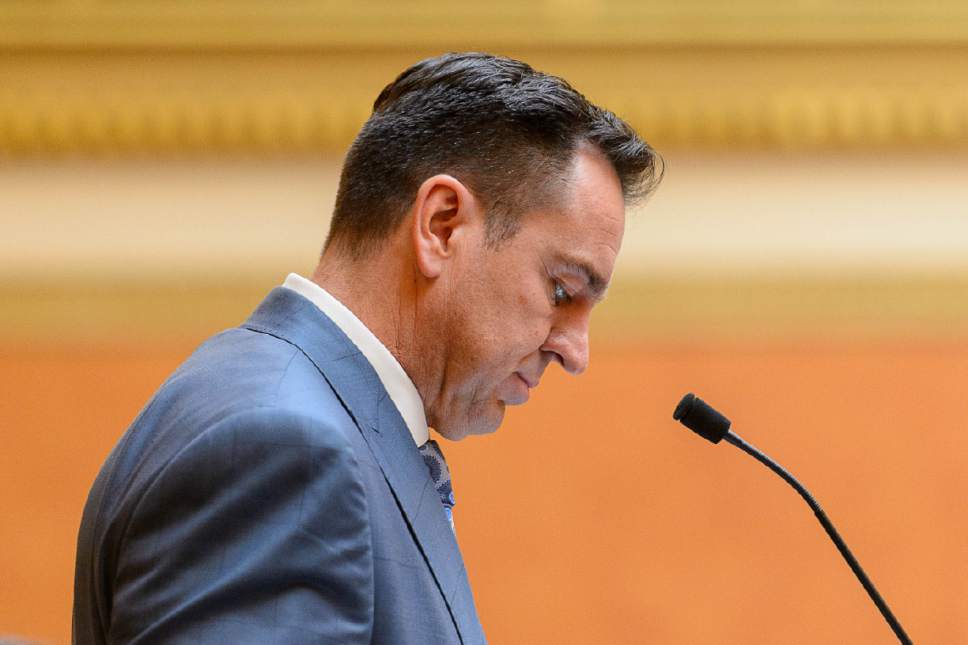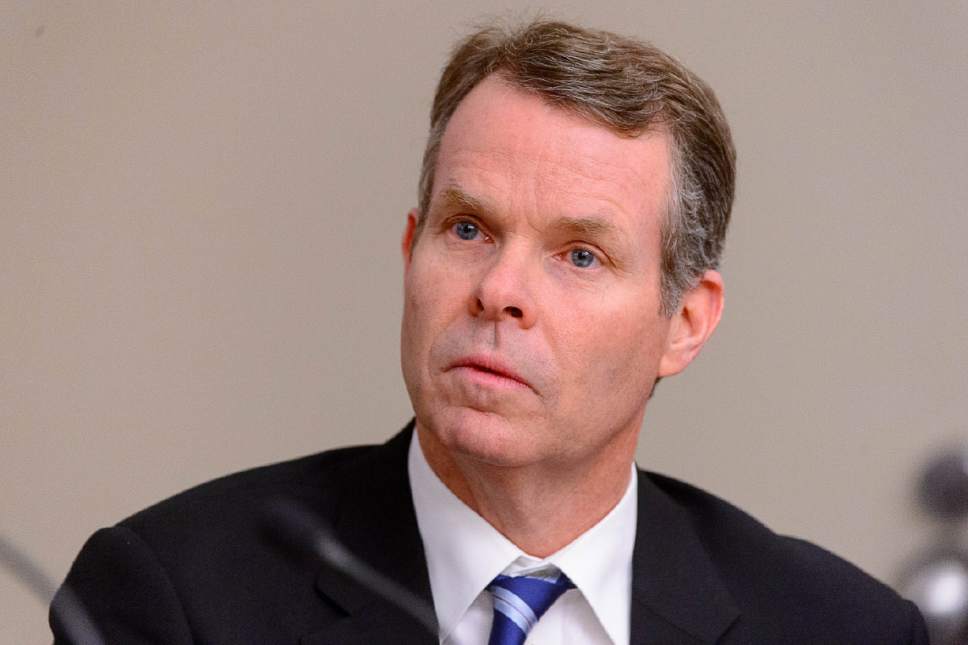This is an archived article that was published on sltrib.com in 2017, and information in the article may be outdated. It is provided only for personal research purposes and may not be reprinted.
Utah House Speaker Greg Hughes' name was dragged into the criminal case against former Utah Attorney General John Swallow on Tuesday in sensational testimony by once-imprisoned businessman Marc Sessions Jenson, whose own case involved allegations of corruption at the top of the attorney general's office.
Jenson testified at a hearing in Salt Lake City's 3rd District Court that Hughes was in a 2009 meeting at a luxury California resort that involved Utah Transit Authority officials, developers working on a project at a Draper train station, then-Attorney General Mark Shurtleff and Swallow, who was a campaign fundraiser for Shurtleff and his designated successor.
That proposed FrontRunner station led to a probe by the attorney general's office, the Utah Legislature and the FBI into allegations of conflicts of interest and self-dealing. No charges have been filed.
Jenson also testified that the group met during that same time with then-U.S. Senate Majority Leader Harry Reid, D-Nev.
The allegations rattled the second day of the 2017 Legislature's general session and prompted a flurry of Twitter posts: Hughes — who served as UTA chairman from 2010 to 2014 — denying allegations that he was ever at the Pelican Hill beachside resort or had ever met Jenson; Shurtleff decrying Jenson's statements and accusing him of perjury.
Hughes also issued a statement, then later went to the House Republican caucus, where he vowed to defend himself under oath in court.
"I want my colleagues to know I have never been to Pelican Hill. I have never been in a meeting with Mark Shurtleff. I don't even know this guy, Marc Jenson. I wouldn't know him if he were standing right here."
He added, "I don't know how we can have a court proceeding going on down there where they can just cherry-pick a name and put me in a position where I have to defend myself against a negative.
"I will clear this," vowed Hughes, who received a standing ovation from most members of the GOP caucus.
Hughes' chief of staff, Greg Hartley, tweeted that Hughes was in Utah on May 5, 2009, when Jenson testified Hughes was at Pelican Hill.
"May 3-9 '09 golden gloves @GHughes51 spoke opening night and attended during the week," Hartley tweeted.
A message seeking comment from Reid, who recently retired from the Senate, was not immediately returned Tuesday.
Jenson is the first person to testify in court under oath about the sweeping allegations of a pay-to-play scandal that resulted in criminal charges being field in 2014 against Swallow and Shurtleff.
It's also likely an indication of what a jury will hear during a 16-day trial for Swallow, which is set to begin Feb. 7.
After Tuesday's appearance, Jenson and his attorney, Helen Redd, said he had testified truthfully, just as he had during his own trial in January 2015, when he was acquitted of criminal charges by a jury.
The purpose of the hearing, which continues Wednesday, is to determine whether a jury can hear out-of-court statements made by Shurtleff and the late Tim Lawson. Prosecutors want to use the remarks as proof of a criminal enterprise. One of the charges Swallow faces is racketeering, which would require showing he was part of an ongoing criminal enterprise or conspiracy.
Shurtleff, who was not called as a witness, showed up at the hearing after Jenson had been on the witness stand for some time testifying about their relationship, which Jenson said included payments of around $250,000 to Lawson, a Shurtleff friend who described himself as the attorney general's "fixer."
Shurtleff was asked to leave the courtroom because he is a possible defense witness at Swallow's trial.
But out in the courthouse corridor, Shurtleff denied Hughes was at the meeting.
"Get this," Shurtleff said, "Marc Jenson is a liar."
The former three-term attorney general, who saw criminal charges against him dismissed last year, also scolded Salt Lake County District Attorney Sim Gill, whose office is prosecuting Swallow, for allowing Jenson to commit perjury by lying under oath on the witness stand.
Gill said he couldn't speak to Jenson's testimony because he was not in the courtroom and had not been briefed about it by his deputies — Chou Chou Collins and Fred Burmester — who are handling the case.
Shurtleff also said prosecutors had not called him as a witness because they knew he would rebut Jenson's testimony.
During his testimony, Jenson said that, in June 2009, when he was on probation after he reached a plea deal to settle 2005 criminal charges, Shurtleff, Swallow and Lawson arrived at Pelican Hill to stay in villas Jenson was renting there. But unlike a previous trip, this time they brought along another man.
Jenson was not introduced to this person, and Shurtleff wouldn't tell him who the "mystery man" was. Only in 2016, after seeing a photo on Instagram, did he realize the mystery man was Hughes and sent Redd, his attorney, a screen shot.
"That was him; that's the guy," Jenson said he told Redd.
Jenson also testified that former UTA general counsel Bruce Jones was there but couldn't identify two or three other men who were present.
Jenson said that the group — not including Jenson — then met with Reid at a nearby office and that Lawson and another developer, Mark Robbins, told him they had met Reid.
The two were buoyant, maintaining they had Shurtleff and the future Utah attorney general, Swallow, protecting them at the state level, and Reid federally, Jenson said.
Emails, development proposals and budget documents provided by Jenson in 2013 showed that Robbins, Jenson's former business partner, was involved in Whitewater VII's development at the Draper FrontRunner station as late as 2010, seeking to round up $65 million in investments for the project.
During cross-examination by Swallow's attorney Scott C. Williams, Jenson went back over some of his story about Pelican Hill and the UTA officials.
When Williams was asking about the times Jenson had reported his allegations about UTA officials to state and federal law officers, Jenson said, "This is really a scary conversation to have."
Williams asked why and Jenson, after a long pause, said, that there had been "kickbacks" involved in the Draper station development — "hundreds of thousands of dollars in cash payments that were made to the three board members."
The three board members were not identified in court, and Jenson was not asked more questions about that assertion.
Swallow is charged with 13 felony and misdemeanor counts, including engaging in a pattern of unlawful activity, accepting a prohibited gift, tampering with evidence, bribery and obstruction of justice. He has pleaded not guilty, but could face up to 30 years in prison if convicted.
Williams had asked for the latest hearing before Judge Elizabeth Hruby-Mills, hoping to block prosecutors from being allowed to use co-conspirator statements or, at least, clarify what statements they want a jury to hear.
Such out-of-court statements — also known as hearsay — are generally not allowed and are usually considered unreliable. Court rules of evidence, however, make some exceptions for their use if prosecutors can convince a judge that the remarks lend truth to their assertion that the former Utah attorney general was engaged in an ongoing criminal scheme.
Court papers say prosecutors want to use multiple statements from Shurtleff and Lawson that were "made in furtherance of a conspiracy or joint venture in order to establish enterprise and mental state."
Williams contends evidence rules require prosecutors to be more specific and has asked the court to order they submit a detailed list of statements. The rule also requires prosecutors to show evidence of the alleged conspiracy that is independent from the Shurtleff and Lawson statements they want to use, court papers say.
Shurtleff was Swallow's predecessor. In 2008, he tapped Swallow to handle his campaign fundraising and later hired him as a civil division boss, paving the way for Swallow's election in 2012.
Lawson was known as the self-described "fixer" for Shurtleff, who helped to drum up campaign donations and was accused of trying intimidate and threaten several Utah businessmen. He died last year while battling his own set of criminal charges that also grew out of the Shurtleff and Swallow scandal.
— Tribune reporter Lee Davidson contributed to this story


